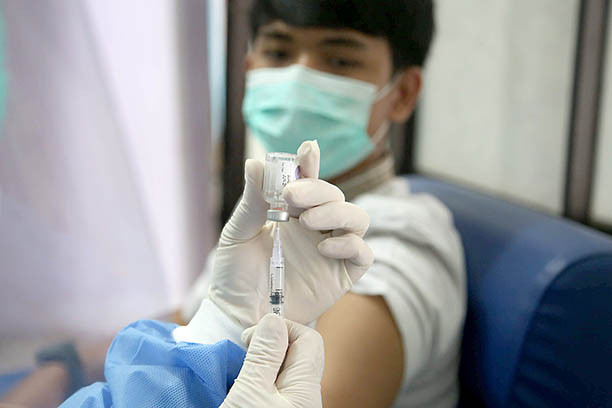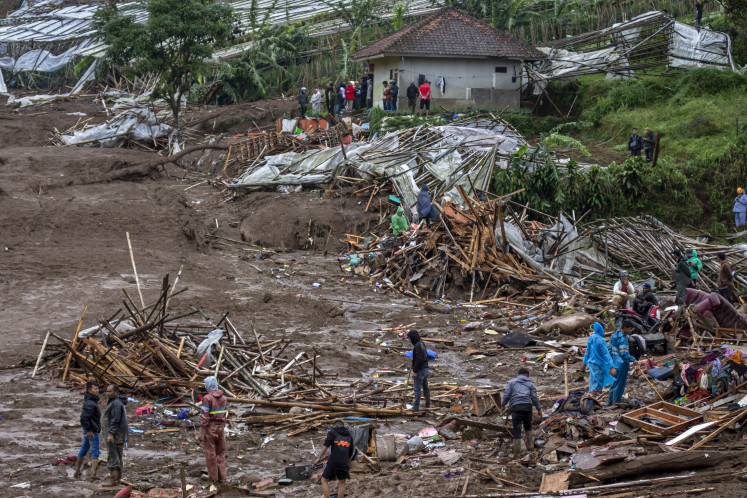Popular Reads
Top Results
Can't find what you're looking for?
View all search resultsPopular Reads
Top Results
Can't find what you're looking for?
View all search resultsWHO urges fair allocation of vaccines
Change text size
Gift Premium Articles
to Anyone
A
s the world watches closely the final stages of human trials of various potential COVID-19 vaccines, concerns have begun to arise over the fair allocation of vaccines and the insurmountable logistical challenges of ensuring wider accessibility.
Speaking in an online event organized by Foreign Policy Community Indonesia on Friday, World Health Organization chief Tedros Adhanom Ghebreyesus said equitable access to vaccines was in the national interest of each and every country.
“In our interconnected world if people in low- and middle-income countries miss out on vaccines, the virus will continue to spread and economic recovery globally will be delayed,” he said in a prerecorded message.
Such challenges have motivated the WHO and international organizations like the Coalition for Epidemic Preparedness Innovations (CEPI) and the GAVI vaccine alliance to establish various platforms to jumpstart vaccine development, he said.
“That’s why the WHO and our international partners created Access to the COVID-19 Tools Accelerator and COVAX facility to develop vaccines, diagnostics and therapeutics fast and to allocate them fairly, especially for health workers, older people and other at-risk groups,” he said.
CEPI senior policy manager Elen Høeg said the COVID-19 pandemic posed a challenge not only to the research and development of vaccines but also on how to ensure they were fairly allocated, as global demand would outstrip the supply.
She noted that some countries had already signed bilateral agreements with various vaccine manufacturers, but this would not be the case for all countries, especially the least-developed countries.
Indonesia announced in August that it was securing deals for priority access to potential COVID-19 vaccines with Chinese pharmaceutical companies Sinovac and Cansino, as well as Sinopharm, which is partnering with Abu Dhabi-based healthcare firm G42. Indonesia has also expressed interest in vaccines from United Kingdom-based pharmaceutical company AstraZeneca and signaled vaccine talks with the United States.
Høeg cited an analysis that found if vaccines were distributed to high-income countries first, it would only prevent 33 percent of deaths, compared with a scenario where the vaccines were distributed equally based on population, which would prevent 61 percent of total deaths.
“So, in other words, fair access for high-, middle- and low-income countries alike will save lives, save economies and allow us to end the pandemic in the best possible way,” she said.
She said 95 high-income countries were already participating in the COVAX multilateral platform, in addition to the 92 countries eligible for vaccines under the GAVI initiative, which would equal about 187 economies and represent 90 percent of the world's population.
Indonesia is one of the countries listed as COVAX 92, which means it is entitled to access to vaccines for 20 percent of its population, or approximately 106-107 million doses if each person gets two injections.
Vladimir Primak of the Russian Direct Investment Fund (RDIF), which handles the distribution and sales of Russia’s Sputnik V vaccine candidate, said that as more vaccine developers finished the final stages of clinical testing on humans -- phase three trials -- and finished interim reports in the following months, regulators must start to find solutions to logistics.
He pointed to the fact that some potential vaccines required extremely cold temperatures, which would require a robust cold chain logistics facility -- a series of precisely coordinated events in a temperature-controlled environment to store, manage and transport vaccines.
“This is a task for all the countries to create such infrastructure if it doesn't exist yet,” he said.
In Indonesia, meanwhile, the national COVID-19 task force claims that the preparations for the cold chain in the country are 97 percent complete.
Weining Meng, Sinovac senior director of overseas business, said that the bulk vaccine arrangement that his company made with Indonesia’s state-owned pharmaceutical company Bio Farma was in part aimed at shortening the logistics chain.
He said in terms of production, his company’s capacity stood at more than 300 million doses per year, but the main bottleneck was the filling and packaging, for which Bio Farma had the capacity.
“So, by collaboration we can fully take advantage of this filling and packaging [and] we can easily increase the capacity,” he said, adding that such an arrangement would also lower the production costs. (dis)










